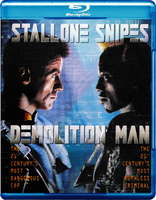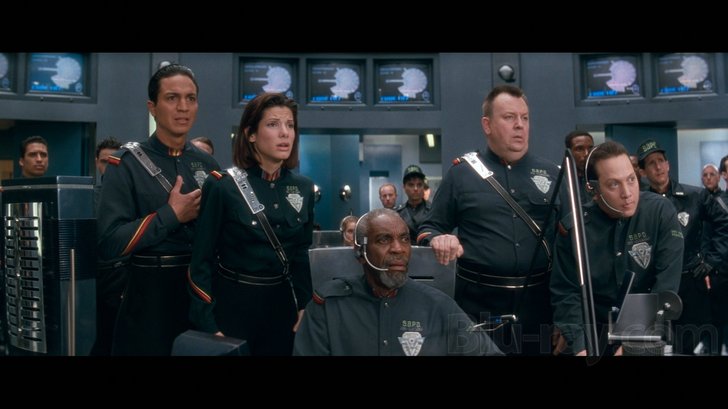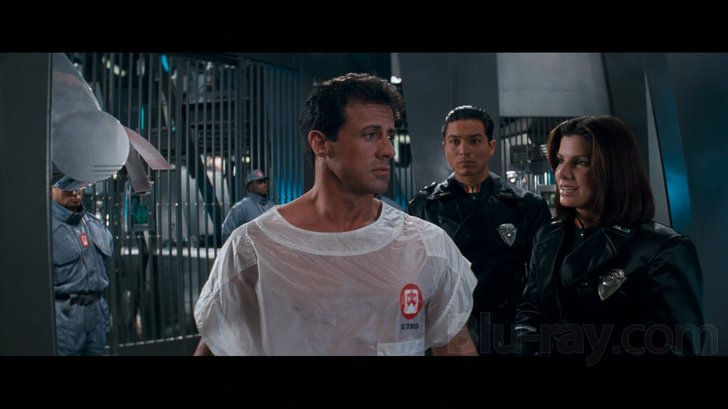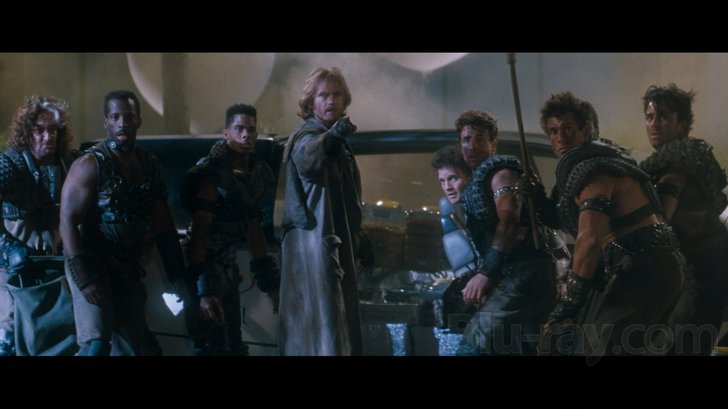Demolition Man Blu-ray Movie
HomeDemolition Man Blu-ray Movie 
Warner Bros. | 1993 | 115 min | Rated R | Aug 16, 2011
Movie rating
7.1 | / 10 |
Blu-ray rating
| Users | 3.8 | |
| Reviewer | 4.0 | |
| Overall | 4.0 |
Overview
Demolition Man (1993)
A cop is brought out of suspended animation in prison to pursue an old ultra-violent enemy who is loose in a nonviolent future society.
Starring: Sylvester Stallone, Wesley Snipes, Sandra Bullock, Nigel Hawthorne, Benjamin BrattDirector: Marco Brambilla
| Action | 100% |
| Thriller | 61% |
| Sci-Fi | 27% |
| Crime | 26% |
| Comedy | Insignificant |
Specifications
Video
Video codec: MPEG-4 AVC
Video resolution: 1080p
Aspect ratio: 2.40:1
Original aspect ratio: 2.39:1
Audio
English: DTS-HD Master Audio 5.1 (48kHz, 24-bit)
French: Dolby Digital 5.1 (640 kbps)
Spanish: Dolby Digital Mono
Portuguese: Dolby Digital Mono
It of course has a bass channel.
Subtitles
English SDH, French, Portuguese, Spanish
Discs
25GB Blu-ray Disc
Single disc (1 BD)
Playback
Region free
Review
Rating summary
| Movie | 4.5 | |
| Video | 4.5 | |
| Audio | 4.0 | |
| Extras | 3.5 | |
| Overall | 4.0 |
Demolition Man Blu-ray Movie Review
Enhance Your Viewing, John Spartan
Reviewed by Michael Reuben August 9, 2011It wasn't until the Nineties that I really began to enjoy Stallone's films. After finishing with the Rocky's and Rambo's (and yes, I know he eventually cranked out another one of each, but let's table those for now), and after painful stabs at light comedy with Oscar and Stop! Or My Mom Will Shoot, Stallone seemed finally to relax and accept the limitations of his star persona -- and that's when he finally made a truly funny film. The story for Demolition Man started with writers Peter Lenkov and Robert Renau, but the initial script flowed from the acid pen of Dan Waters, the darkly satirical mind behind Heathers. Waters' script turned the action genre inside out by marrying it to a wicked satire of political correctness in all shapes and sizes -- and, amazingly, much of Waters' signature wit survived the script's acquisition by producer Joel "Blow Stuff Up" Silver. Stallone was perfect for the material. All he had to do was be his classic screen self and demolish everything in sight, just as the title suggested. Waters had crafted a unique twist on the "fish out of water" story (more accurately, "fish out of cryo-freeze"), where the humor arose from constant clashes between Stallone's beefcake bull in a china shop and the delicate figurines he kept knocking over. The more Stallone behaved just as the audience expected, the better the scenes played. But casting the other parts was crucial, and thereby hangs a career tale. The main comic foil to Stallone's one-man wrecking crew was a female cop from the future named Lenina Huxley (the very name is an obscure literary joke), and after a single's day shooting, the actress initially cast to play her, Lori Petty, wasn't working out. With production already underway, the part was recast with a then-little-known actress named Sandra Bullock, who proceeded to steal the picture not only from Stallone but even from a hyperkinetic Wesley Snipes playing the cheerfully psychotic bad guy, Simon Phoenix, with a peroxide 'do that was memorable enough to inspire basketball star Dennis Rodman to copy it. Snipes's wild hair and wilder behavior were all in vain. You walked out of the theater remembering Bullock and wondering, "Who was that?" Eighteen years later, it's still one of her funniest roles.

Demolition Man is one of those movies where the filmmakers took the risk of picking dates in the near future, but actual events unfolded differently such that the film is now an "alternate" future. When production began in late 1992, the Rodney King riots were fresh in everyone's memory, and the film opens with a vision of Los Angeles in 1996 that makes Blade Runner look like paradise. Downtown has become an urban war zone controlled by criminals, of which the worst is Simon Phoenix (Snipes), who has declared his own kingdom. Most recently, Phoenix has grabbed a city bus and taken thirty passengers hostage. Phoenix's nemesis is supercop John Spartan a/k/a The Demolition Man of the title (Stallone, of course). "Send a maniac to catch a maniac", says Spartan, before bungee-jumping onto the roof of Phoenix's lair from a chopper piloted by rookie Zachary Lamb (Grand L. Bush, the younger Agent Johnson in Die Hard). Director Marco Brambilla conceived this sequence as the equivalent of a Bond movie's high-octane opening, and it works beautifully, in no small part because of the manic joy with which Snipes plays Phoenix and the equally joyful aplomb with which Joel Silver's production company detonated a real, full-size building they found right near L.A. No scale models for this demolition! But even though Spartan captures Phoenix, he's been set up to take the fall for the deaths of the bus passengers. In an obvious miscarriage of justice, Spartan is convicted of involuntary manslaughter and sentenced to seventy years of the newly developed penalty called cryo-freeze (look carefully during the title sequence, and you can see that the facility is still being built). Phoenix is frozen right next to him. Jump forward to 2032. The whole of Southern California has been destroyed by an earthquake in 2010 (uh, no, didn't happen). In its place, there rose the San Angeles Metroplex, unifying what was formerly Santa Barbara, L.A. and San Diego. It's presided over by Dr. Raymond Cocteau (Nigel Hawthorne), a utopian genius (or possibly madman), whose philosophy of peace and harmony brought much needed order to a troubled world and whose company, Cocteau Industries, just happens to have developed the cryo-freeze process. In this world, there's no crime, no individuality and a lot of mindless contentment, because every possible irritant has been banned, from guns to abortion to sex (at least as we know it). Indeed, no matter where you stand on the political spectrum, your pet cause has probably been nullified. It would be fun to start listing them, but I'll leave it for first-time viewers to discover, along with the mystery of the three sea shells and the ascendancy of Taco Bell.

Demolition Man Blu-ray Movie, Video Quality 

Director Brambilla and his DP, Alex Thomson, designed a distinctive look for the bulk of Demolition Man (the chief exceptions being the pre-credit sequence in 1996 and the underground sequence in 2032). Brambilla wanted the pseudo-utopian future society into which John Spartan awakes to look "cosmetic" and interiors like the SAPD station to resemble a Neiman Marcus store. Thomson used slow film stock to minimize grain and shot through special filters that softened the image without losing shadow detail. For exterior scenes, smoke was used both to conceal contemporary scenery in portions of the frame and to change the density and texture of the image. (Brambilla refers to the desired look as "liquid lighting".) As it happens, this look is a good friend to home video. The laserdisc and DVD versions of Demolition Man were among the better-looking examples of each format, in terms of color values, and the DVD was all the more impressive for being an early release. However, the 1080p, AVC-encoded Blu-ray offers major improvements in detail, depth and color differentiation. One is much more aware of the details of Bob Ringwood's futuristic costumes (many of which are mini-jokes unto themselves), or the 20th Century bric-a-brac in Huxley's office and apartment, or just the individual facial expressions in long shots crowded with people at the SAPD or Taco Bell. The improvements are most dramatic in the sequence where Spartan, Huxley and Garcia venture underground, and the color pallette changes from the prevailing blues and greens to earth tones. Here, the improvement in shadow detail is even more notable. When Phoenix and his gang attack, I've always found it difficult on prior versions to follow the logistics of who's doing what, but on the Blu-ray the action is easy to follow, because the image remains finely detailed throughout, even though it doesn't have the hard-edged "Discovery Channel" look that viewers sometimes mistakenly equate with sharpness. Black levels are excellent, which is essential for the various night, underground and darkened indoor scenes. There has been no DNR or filtering applied, other than what was used in the original photography. The alert viewer may notice that the complexions of most people in the future are exceptionally smooth, but that's part of the make-up design, and it's meant to indicate what happens when one leads a stress-free life full of "joy-joy" feelings and without exposure to all the damaging substances that Dr. Cocteau has forbidden. Look closely at Spartan or Phoenix, and you'll see that their faces still have texture, as befits their status as barbarians of the 20th Century.
Demolition Man Blu-ray Movie, Audio Quality 

From the moment that Spartan's helicopter flies over the burning Hollywood sign and you hear tracer bullets coming at you from the sides, you know you'll get an action mix that uses the entire surround system. Demolition Man was released in 1993, when discrete 5.1 systems were just becoming established in movie theaters. But those theaters that were equipped for Dolby Digital received a 5.1 mix that first appeared for home video four years later on DVD. Gunfire, explosions, shattering glass, collapsing buldings, the high-tech clang of Phoenix's futuristic rifle and other sounds of mayhem fill the surround field and should generally satisfy one's appetite for cinematic destruction. The subwoofer gets reasonable use, though nothing to compare with, e.g., a Transformers movie. The dialogue, which, unlike in most action films, is important and worthwhile, is clear and intelligible. Eliot Goldenthal wrote the score, and it's one of his wittiest. Goldenthal clearly got the joke, and he knew when to write something grandiose (like the theme that accompanies Spartan's two narrow escapes from exploding buildings) and when to supply something ridiculous (like the cartoonish tomfoolery heard when Spartan is trying to gain control of a runaway police car). The film's title, of course, comes from a Police song on the 1981 album Ghost in the Machine, and a newly recorded version by Sting is heard over the closing titles. I prefer the original, but that's not the fault of the soundtrack.
Demolition Man Blu-ray Movie, Special Features and Extras 

The special features have been ported over from the 1997 DVD release.
- Commentary with Director Marco Brambilla and Producer Joel Silver: Silver is barely present, making a few remarks at the outset, then disappearing for the rest of the commentary. Brambilla speaks continuously thereafter, providing a wealth of useful information about locations, production design, cinematography, and even a few tantalizing references to early versions of the script. (If only the writers had been interviewed!) One of the most interesting elements running throughout Brambilla's remarks is his clear understanding that he was making a comedy, which guided his choices in such things as how graphic to make the violence (e.g., when Phoenix shoots at a group in the cryo-prison, should they be shown getting hit by bullets, or should we just see Phoenix shooting? or should he not shoot at all?). One of the most frustrating elements of the commentary is Brambilla's frequent reference to deleted scenes, especially those involving Spartan's daughter (who was originally part of the underground "scraps" society) and such incidental events as the death of Zachary Lamb. One wishes those had been presented as a separate extra.
- Theatrical Trailer (SD; 1.85:1, enhanced; 2:06): I remember this trailer well, because it made effective use of a theme from Bram Stoker's Dracula.
Demolition Man Blu-ray Movie, Overall Score and Recommendation 

With due regard for the cultural significance of Rocky and Rambo, I regard Demolition Man as one of Stallone's best films and certainly one of his most enjoyable. It's also one of Bullock's best. How often does one get to watch a career being born? Because the film's effects were largely practical and mostly full-scale, they've held up well, and the script's wit is just as sharp today as when the film was new, even though the future unfolded differently than the screenwriters imagined. The Blu-ray's technical quality is solid, and while one might wish for additional extras, those that are included are first-rate. Highly recommended.
Similar titles
Similar titles you might also like

Tango & Cash
1989

Assassins
1995

Bad Boys for Life 4K
IMAX Enhanced
2020

A Good Day to Die Hard
Extended Cut
2013

Rush Hour 3
2007

Lethal Weapon 3
1992

Judge Dredd
1995

Gamer
2009

Death Race
2008

S.W.A.T.
2003

The Running Man 4K
1987

Face/Off 4K
1997

Red Heat 4K
1988

RoboCop 4K
Collector's Edition
2014

Lethal Weapon
1987

Dredd 4K + 3D
2012

Repo Men
2010

Cobra
Collector's Edition
1986

RoboCop 3
Collector's Edition
1993

The Specialist
1994